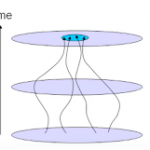“What matters?” is a surprisingly interesting question. I think about it constantly since it weighs-in whenever plotting future choices, though often I seem to be more autopilot than consequentialist in these conceptions. It is an essential first consideration when trying to value one option versus another. I can narrow the question a bit to “what ideas matter?” This immediately externalizes the broad reality of actions that meaningfully improve lives, like helping others, but still leaves a solid core of concepts that are valued more abstractly. Does the traditional Western liberal tradition really matter? Do social theories? Are less intellectually-embellished virtues like consistency and trust more relevant and applicable than notions like, well, consequentialism?
Maybe it amounts to how to value certain intellectual systems against others?
Some are obviously more true than others. So “dowsing belief systems” are less effective in a certain sense than “planetary science belief systems.” Yet there are a broader range of issues at work.
But there are some areas of the liberal arts that have a vexing relationship with the modern mind. Take linguistics. The field ranges from catalogers of disappearing languages to theorists concerned with how to structure syntactic trees. Among the latter are the linguists who have followed Noam Chomsky’s paradigm that explains language using a hierarchy of formal syntactic systems, all of which feature recursion as a central feature. What is interesting is that there have been very few impacts of this theory. It is very simple at its surface: languages are all alike and involve phrasal groups that embed in deep hierarchies. The specific ways in which the phrases and their relative embeddings take place may differ among languages, but they are alike in this abstract way.… Read the rest







